http://news.fsu.edu/news/science-technology/2016/10/24/fsu-unveils-floridas-advanced-mri-machine/
FSU unveils Florida’s most advanced MRI machine
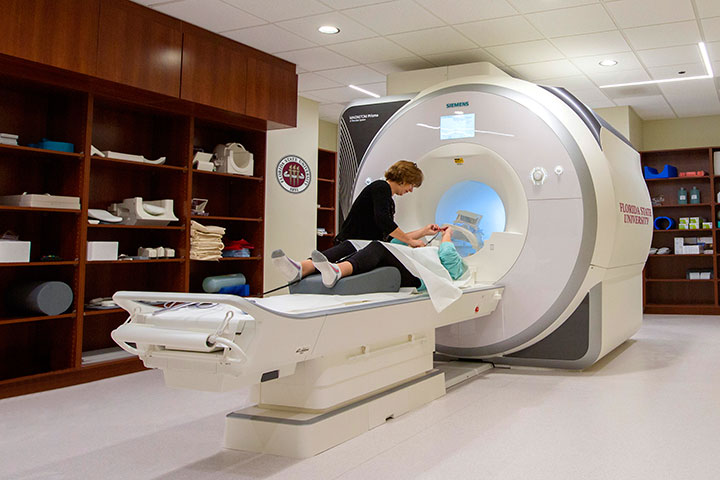
Florida State University researchers now have the state’s most advanced MRI machine at their disposal as they seek to unravel the mysteries of the brain and prevent the disorders that can impede its most basic functions.
The new functional magnetic resonance imaging (fMRI) machine, located in the College of Medicine, will allow FSU researchers from across the university to advance their exploration in areas such as psychological disorders, memory and cognitive control, and changes associated with aging.
“Our fMRI machine represents the latest and greatest in terms of MRI technology and opens up a whole new world of research possibilities for our faculty,” said FSU Vice President for Research Gary K. Ostrander. “The images you can capture with this machine are simply incredible. It is analogous to upgrading from an old Polaroid instant camera to one of today’s high-end digital offerings.”
Although fMRI technology is not new, it is rare given its expense, complexity and the significant expertise needed to maintain and operate the machines. FSU’s fMRI is now the most sensitive and sophisticated MRI machine currently in Florida.
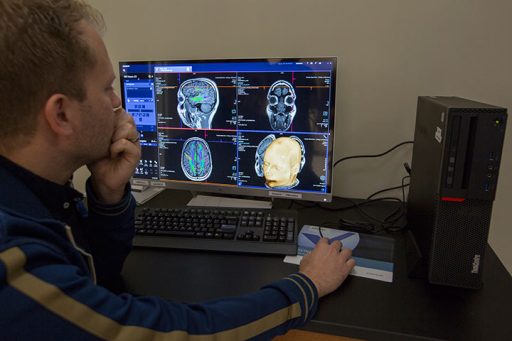
“We have been working toward this purchase for a long time, and I am very pleased that we are seeing the culmination of that effort,” said College of Medicine Dean John P. Fogarty. “This joint project with the provost and the vice president for research will greatly enhance our research capabilities and add to our already strong focus on neuroscience and neurodegenerative disease discovery. It reflects well on our interdisciplinary focus and efforts to expand our knowledge of both behavioral and disease processes in the brain.”
MRI technology, which has been in use since the 1970s, uses strong magnetic fields, radio waves and field gradients to provide high-resolution images of the body. While traditional MRI machines provide images of the brain and its structure, they are unable to show brain activity.
FMRI machines solve this problem by detecting and mapping blood flow changes in the brain. When areas of the brain are in use, blood flow to those areas increases significantly, providing a reliable method to track brain activity and interaction.
Reinforcing FSU’s interdisciplinary research approach, the fMRI facility will be open to faculty from across campus, particularly those working in neuroscience-related fields of study.
“FSU has a focus and strength in neuroscience, and if we want to remain competitive in this field then we need to invest in the best technology,” Ostrander said. “In fact, over the last couple of years we have been able to recruit some outstanding faculty members based on the promise of this machine. Now that we have it, I cannot wait to see what they are able to accomplish with it.”
http://www.tallahassee.com/story/news/2016/10/24/fsus-college-medicine-introduces-new-mri-facility/92682498/
State-of-the-art machine will enhance brain research conducted by multiple disciplines
"Florida State University on Monday unveiled the most advanced MRI machine in the state, representing a nearly $3 million investment administrators say will secure the university’s ability to conduct advanced brain research for decades.
By having access to the powerful functional magnetic resonance imaging machine researchers across academic disciplines will be able to conduct research on humans that could lead to breakthroughs in how the brain functions.
It also is a major research tool that will help the university attract top scholars who bring with them a pipeline to millions of dollars in research grants.
The 3T Prisma MRI built by Siemens is housed in a room on the lower level of the College of Medicine, where a celebration and tour was held on Monday. To prepare the room to house the device, it had to be shielded on all sides with six layers of steel and a layer of copper to protect it from radio waves.
The 13-ton machine, which is 60 centimeters in diameter, was installed in June.
“This is not your grandfather or father’s MRI,” FSU President John Thrasher said. “This is a highly sophisticated machine that can detect and map blood flow changes in the brain in order to track brain activity.
“This machine will open up a whole new world of research possibilities for our faculty, and it’s hard to imagine a more important area of study than the brain.”
Gary Ostrander, vice president for research, said research capabilities at FSU now will be in the forefront of the country’s renewed focus on the brain and how it functions.
“We will be doing research for the next generation of MRIs,” he said.
“We will bring in millions more dollars in research,“ he said, adding the university already has brought some of the country’s top scholars and more are being hired.
“We recruited professors who knew we were buying this,” Ostrander said. “There is no question we wouldn’t have been able to recruit these people (without it). It’s a huge deal.”
Ostrander pulled out his smartphone to show the clarity of some of the images of the brain already produced.
“The images you can capture with this machine are simply incredible,” he said. “It is analogous to upgrading from an old Polaroid instant camera to one of today’s high-end digital offerings.”
Jens Rosenberg, a researcher at the National High Magnetic Field Laboratory, explained Mag Lab has the world’s strongest MRI at 21.1 Tesla. But it’s designed for research using mice, or animal models, like rats.
“Here at the College of Medicine, it’s 3T, a state-of-the-art human research magnet,” he said. “It has hardware (and software) that makes it stand out from traditional clinical diagnostic imaging. We can acquire higher sensitivity and higher-resolution images.
“One of the main things we will be doing is functional MRI, which measures the activity in a specific region of the brain.”
Fogarty said it is important to note the MRI is for research purposes only. He said FSU’s Psychology Department has had a contract with a local medical group to conducts its research, but now that can be done on campus.
Some initial tests already have been conducted using human volunteers.
“This is a research magnet right now, not a clinical magnet,” Fogarty said. “It will be open just when the investigators are here.”
Byron DobsonVerified account
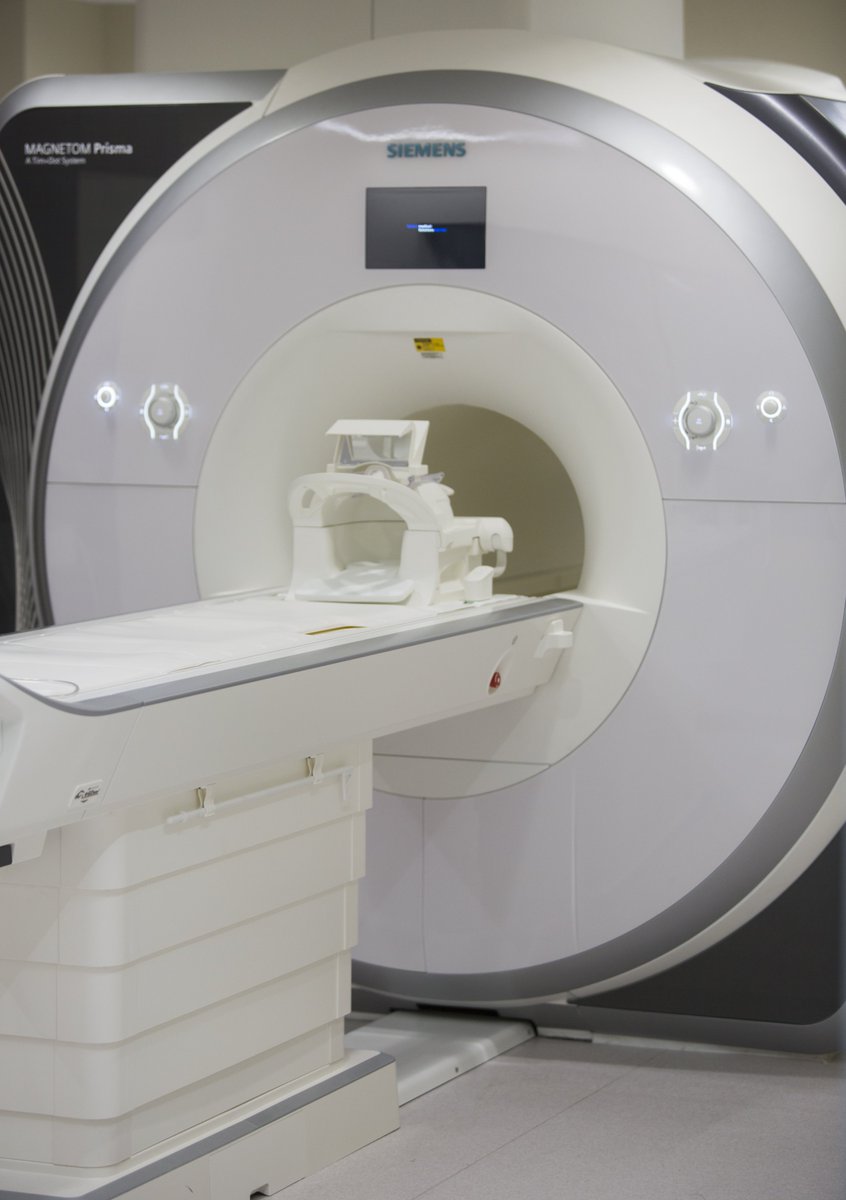

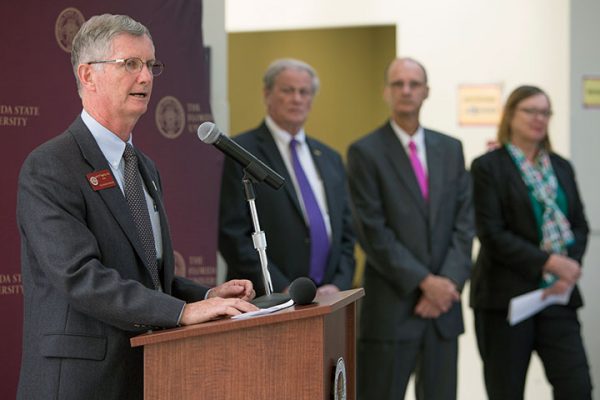
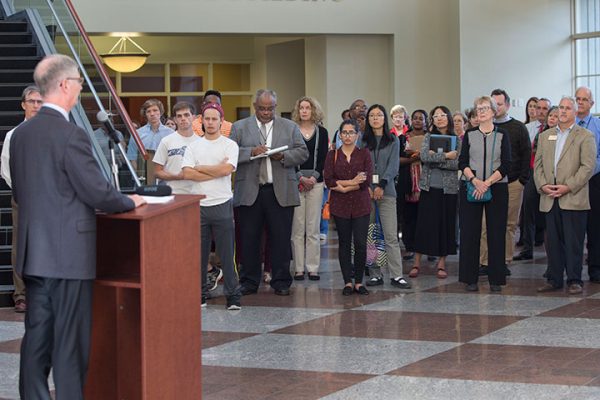

No comments:
Post a Comment